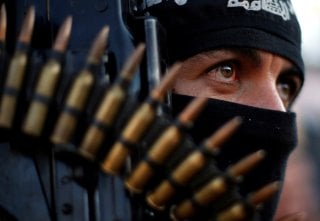The U.S. Should Sanction Gaza’s Popular Resistance Committees
Even though the PRC has American blood on its hands, as well as that of Israelis, the group has somehow escaped U.S. sanctions.
At a rally in late February, a spokesman for the Iranian-backed Popular Resistance Committees (PRC), Gaza’s third-largest terror group, boasted of his organization’s recent attacks against Israel. The PRC spokesman, known as Abu Mujahid, ended his speech by threatening further terrorism, saying “our missiles are ready in their stands to protect our people until the Zionist enemy is swept [sic] and the land and the holy sites are liberated.”
Even though the PRC has American blood on its hands, as well as that of Israelis, the group has somehow escaped U.S. sanctions. The Biden administration should correct this oversight by designating the PRC as a Foreign Terrorist Organization (FTO), a status that would restrict the group’s ability to raise and move money, procure weapons, and spread propaganda.
The PRC, an offshoot of Fatah, was founded in 2000 amidst the wave of attacks that became known as the Al-Aqsa Intifada. In 2003, the group claimed responsibility for a 200-pound bomb that detonated beside a convoy carrying a U.S. diplomat, injuring him and killing three security guards, all Americans. The next year, PRC gunmen ambushed a car driven by a pregnant Israeli woman, Tali Huetel, and her four daughters. The assailants shot them all at point-blank range.
The PRC has also targeted Palestinian rivals. In 2005, its gunmen shot and killed the former head of the Palestinian security services, Moussa Arafat, a cousin of former Palestinian Authority President Yasser Arafat. The PRC later cited the target’s corruption as justification for the killing.
The State Department was aware of the growing threat from the PRC between 2001 and 2009 yet the George W. Bush administration failed to enact sanctions. In its annual terrorism report for 2005, the department noted the PRC was responsible for a “significant amount of attacks” originating from southern Gaza, including a truck bombing it carried out in conjunction with two U.S.-designated FTOs.
Designating the PRC as an FTO would block the group’s access to most banks around the world and allow federal law enforcement to seize its financial assets, including cryptocurrency wallets. In August 2020, the Justice Department announced its largest-ever seizure of terrorist-affiliated cryptocurrency accounts, including 150 belonging to Hamas, which had previously asserted that its cryptocurrency donations were “untraceable.”
Hindering the PRC’s access to funds might curtail its rocket attacks against the Israeli population. In 2008, the group announced it had fired rockets at Israelis living in the Negev in response to a Danish newspaper’s publication of cartoons depicting the prophet Muhammad. The PRC later claimed to have killed civilians during the 2014 Gaza-Israel war by launching rockets at Israeli cities. In 2019 and 2021, the group used rockets to target civilians living in Tel Aviv and its environs.
After the conflict in Gaza last May, the PRC gave the Beirut-based Al-Mayadeen news channel access to one of its manufacturing facilities. A spokesperson dressed in military fatigues demonstrated how the group produced mortars and rockets, including how it positioned projectiles to launch near what appeared to be civilian infrastructure.
Designating the PRC as a terrorist organization could limit its access to web-hosting services and social media platforms. The PRC uses two websites as well as several Telegram channels and Facebook pages to spread propaganda, including videos of attacks from the conflict last May. The organization also used these media to promote videos and statements made by the “Joint Operations Room,” a coordinating body comprising the PRC and numerous Palestinian factions, many of them under U.S. terror sanctions.
Finally, an FTO designation could help the U.S. government partner with social media sites to eliminate the PRC’s access to their platforms, replicating the U.S. government’s previous work against ISIS, Hamas, Al Qaeda, and many other terror groups.
Of course, a U.S. designation won’t completely cut off the group from its funding sources. The PRC receives support from Iran and its terrorist proxy in Lebanon, Hezbollah. Iran’s Islamic Revolutionary Guard Corps (IRGC) has consistently provided the PRC with weapons and the know-how to manufacture rockets. Last November, a PRC spokesman credited Tehran for every “missile, shell or tool of the Resistance” delivered to the group. He also thanked Hezbollah for having “spared no effort in developing our capabilities and arming us.” This kind of activity will only increase if the Biden administration removes the IRGC from the FTO list as part of the revised nuclear deal it is currently negotiating with Tehran.
It’s long past time to label the PRC as the terror group that it is. Doing so could save lives, both American and Israeli.
Joe Truzman is a research analyst at the Long War Journal, a project of the Foundation for Defense of Democracies, a nonpartisan research institute. Follow Joe on Twitter @JoeTruzman.
Image: Reuters.

